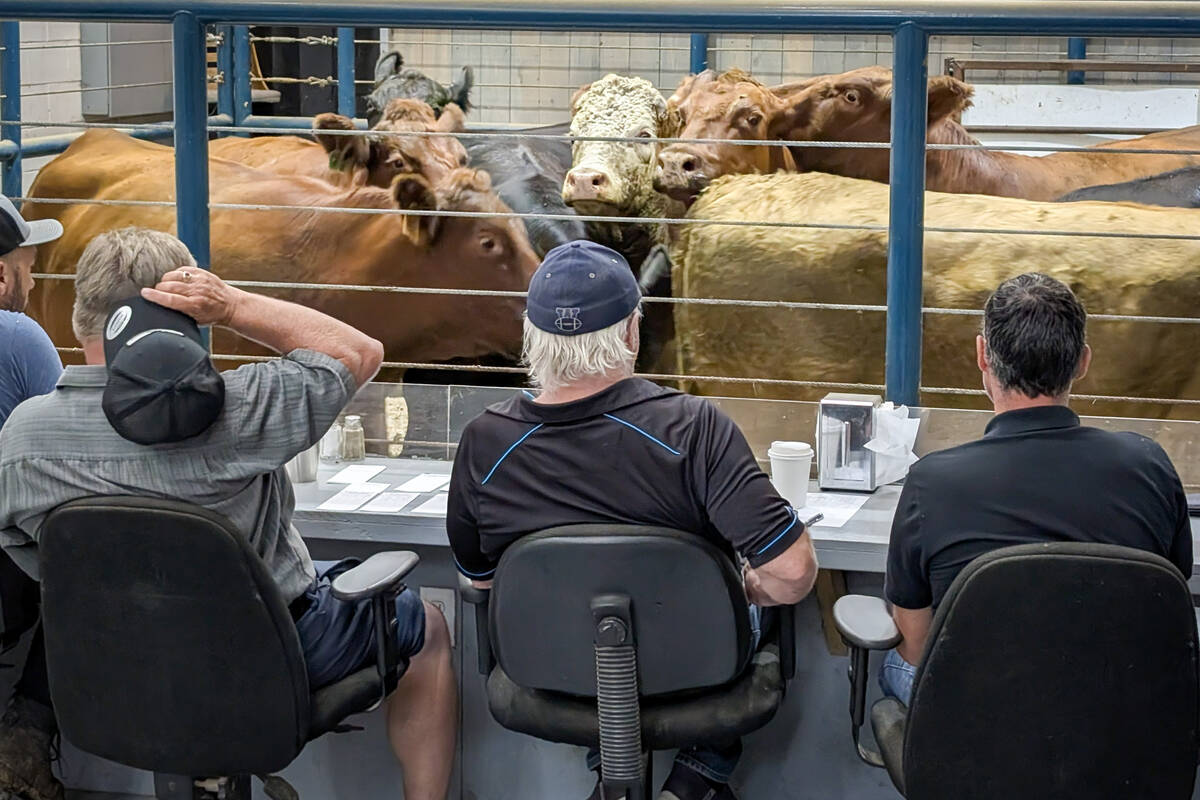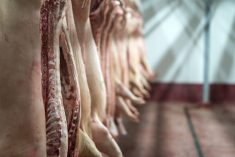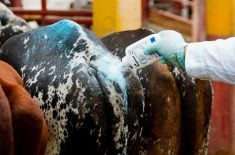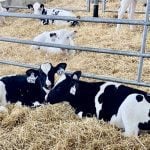Federal and provincial officials have confirmed the arrival of the porcine epidemic diarrhea virus (PEDv) on a hog farm in southwestern Ontario’s Middlesex County.
“We’ve suspected this day may come…and we’re working with stakeholders across Canada to stay on top of this,” Dr. Greg Douglas, Ontario’s chief veterinary officer, told a media conference call Thursday.
Officials emphasized that PEDv — while devastating especially to piglets in infected herds, as seen in its spread through U.S. hog-producing states in recent months — is not a threat to human health, nor to the safety of pork products for human consumption, as meat from infected hogs is safe to eat.
Read Also

U.S. livestock: Cattle rally, hogs slide
Chicago cattle futures regained a ground on Monday to maintain a fairly level trajectory after last week’s fall.
“Significant mortalities” were reported on the affected farm Wednesday, Douglas said, and PEDv was confirmed Wednesday night by way of laboratory tests in Guelph.
Samples from the farm are now being shipped to federal laboratories in Winnipeg for further testing and genetic sequencing, he added, but “for all intents and purposes you can consider it confirmed” as PEDv.
The Middlesex farm “is following, and has followed, strict biosecurity protocols,” Douglas said. No pigs will be leaving the farm at least in the short term, he added, and officials have “every confidence” in the producer, noting the farm is co-operating fully both with animal health officials and with its attending veterinarian.
Given the high-health status of the herd, the cases on the farm show the virus is “extremely difficult to contain,” Douglas said.
“It comes down to how intensive the viral burden is outside the barn door,” he said, adding that PEDv is known to survive better in winter than during the summer.
PEDv, most often fatal to very young pigs, causes diarrhea, vomiting and dehydration. It also sickens older hogs, though their survival rate tends to be high.
At an Ontario Pork town hall meeting in late November, producers were told the cost of the disease in a sow herd could be about five weeks’ worth of piglet mortality, translating to an estimated $125,000 in losses in a 1,000-sow herd.
Previously seen in parts of Asia and Europe, the virus arrived in North America in the spring of 2013, first appearing in the U.S. in May in a few hog-raising states and subsequently spreading.
Canada until now had never shown a confirmed case of the virus, which was not a reportable or immediately notifiable disease at the time cases began appearing in U.S. herds.
Douglas emphasized that while the virus led to multiple piglet deaths on the infected farm, it’s still only been seen on one farm.
From the Alberta Farmer Express: Disinfectant ineffective against pig virus – U.S. study
“Serious threat”
That said, the virus itself has made one other appearance in Canada this week, turning up in a swab test on an unloading dock at a hog slaughter plant at Saint-Esprit, Que., north of Montreal.
The testing has been regularly done at the plant in a series of “special measures” in place since November, according to Richard Vigneault, a spokesman for Quebec pork packer Olymel, which operates the St-Esprit plant.
The pork plant continues to operate, under even further reinforced sanitation procedures, he added.
It’s not known how the virus, which was confirmed Tuesday night, appeared at the dock, but Vigneault on Thursday said trucks supplying hogs to the plant would have loaded either in Quebec or Ontario and would not have come from the U.S.
Asked about any possible connection during Thursday’s conference call, Douglas said it’s “probably not fair for me to comment” on the Olymel finding, which did not involve any clinical signs in any livestock.
Vigneault also emphasized Thursday that the virus remains a “very serious threat” to Canada’s hog and pork industry, and protecting herds from the virus will involve co-operation among all players in the industry.
Vigneault also emphasized the virus poses no risk to public health.
Ontario Pork officials have estimated about 55 trucks leave that province each week for U.S. pork processing plants and many of those return each week through the same border ports, while the rest had west to re-enter Canada, returning to Ontario with cattle and possibly pigs.
Canadian trucks returning from the U.S. “need to scrape out at a site with no potential for other pig contact,” Ontario Pork said in late November. “This is regardless of whether or not they have trucked cattle in between.”
All trailers returning to Canada from the U.S. should be “washed and disinfected prior to contact with any Canadian pig sites with confidence in wash bay procedure.”
Given the viral burden, this is “high alert time for everyone in this industry,” Ontario Pork said, “and please don’t delay if there are any suspicious signs. Let’s over-react rather than under-react right through to next summer.”
— Dave Bedard is editor of daily news for the AGCanada.com Network in Winnipeg.
Related stories:
Cold, wet weather may help spread deadly piglet virus: USDA, Jan. 10, 2014
Hog haulers warned not to wash trucks with recycled water, June 25, 2013
U.S. pork industry hunts for hog diarrhea virus, May 28, 2013
















